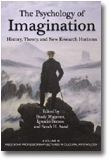
The Psychology of Imagination
History, Theory and New Research Horizons
Edited by:
Brady Wagoner, Aalborg University
Ignacio Brescó de Luna, Aalborg University
Sarah H. Awad, Aalborg University
A volume in the series: Niels Bohr Professorship Lectures in Cultural Psychology. Editor(s): Brady Wagoner, Aalborg University. Nandita Chaudhary, University of Delhi. Pernille Hviid, University of Copenhagen.
Published 2017
This book offers a new approach to imagination which brings its emotional, social, cultural, contextual and existential characteristics to the fore. Fantasy and imagination are understood as the human capacity to distance oneself from the here‐and‐now situation in order to return to it with new possibilities. To do this we use social‐cultural means (e.g. language, stories, art, images, etc.) to conceive of imaginary scenarios, some of which may become real.
Imagination is involved in every situation of our lives, though to different degrees. Sometimes this process can lead to concrete products (e.g., artistic works) that can be picked up and used by others for the purposes of their imagining. Imagination is not seen here as an isolated cognitive faculty but as the means by which people anticipate and constructively move towards an indeterminate future. It is in this process of living forward with the help of imagination that novelty appears and social change becomes possible.
This book offers a conceptual history of imagination, an array of theoretical approaches, imagination’s use in psychologist’s thinking and a number of new research areas. Its aim is to offer a re‐enchantment of the concept of imagination and the discipline of psychology more generally.
CONTENTS
Introduction. PART I: NIELS BOHR LECTURE. From Fantasy to Imagination: A Cultural History and Moral for Psychology, Carlos Cornejo. PART II: CONCEPTUAL AND HISTORICAL ANALYSES. Use your Imagination: The History of a Higher Mental Function, Luca Tateo. Reviving the Logic of Aesthetics: Poetry and Music in Cultural Psychology, Sven Hroar Klempe and Olga V. Lehmann Oliveros. Kant and Goethe? The Imaginative Link Between Sensuality and Concepts, Bo Christensen and Steen Brock. The Sinnlichkeit of Panoramic Experience, Jaan Valsiner. PART III: THEORETICAL APPROACHES AND DEVELOPMENTS. Ruins and Memorials: Imagining the Past through Material Forms, Zack Beckstead. Fantasy and Imagination: From Psychoanalysis to Cultural Psychology, Tania Zittoun. Hope as fantasy: An Existential Phenomenology of Hoping in Light of Parental Illness, Ditte Alexandra Winther‐Lindqvist. From Fantasy and Imagination to Creativity: Towards a ‘Psychology with Soul’ and ‘Psychology with Others’, Vlad Glaveanu. PART IV: THE SCIENTIFIC IMAGINATION IN PSYCHOLOGY. The Dynamics of ‘Necessity’ Shaping our Imaginative Lives: a Pre‐Conceptual Account of Discriminative Word Usage, John Shotter. Amerindian Psychology: The Cultural Basis for General Knowledge Construction, Danilo Silva Guimarães. Gaps in Human Knowledge: Highlighting the Whole Beyond our Conceptual Reach, Lucas Mazur. Nature Leaves no Gaps: From Scientifically Dissected Phenomena Back to the Whole, Meike Watzlawik. PART V: NEW RESEARCH HORIZONS. “We are Not Free, Admit it... But We Cling onto Tomorrow”: Imagination as a Tool for Coping in Disempowering Situations, Sarah H. Awad. Feeling Myself with Nature: Reflections on Picking Flowers in Japan and Denmark, Rebekka Mai Eckerdal. Russian Revival of the St. George Myth and its Imagery: A Study Based on Reconstructive Picture Interpretation and Psychoanalysis, Stefan Hampl and Dominik Mihalits. PART VI: CONCLUDING RESPONSE. Conclusion: The Re‐Enchantment of Psychology, Carlos Cornejo.
-
Paperback9781681237091
Web price: $45.04 (Reg. 52.99)
-
Hardcover9781681237107
Web price: $80.74 (Reg. 94.99)
- eBook9781681237114

- PSY040000 - PSYCHOLOGY: Experimental Psychology
- PSY031000 - PSYCHOLOGY: Social Psychology
- PSY008000 - PSYCHOLOGY: Cognitive Psychology
-
 Cultural Psychology and Its Future
Complementarity in a New Key
Cultural Psychology and Its Future
Complementarity in a New Key
-
 Digital Developments
Perspectives in Psychology
Digital Developments
Perspectives in Psychology
-
 Home in Transition
The Cultural Construction of Heimat
Home in Transition
The Cultural Construction of Heimat
-
 Integrating Experiences
Body and Mind Moving Between Contexts
Integrating Experiences
Body and Mind Moving Between Contexts
-
 Memory in the Wild
Memory in the Wild
-
 The Road to Actualized Democracy
A Psychological Exploration
The Road to Actualized Democracy
A Psychological Exploration
-
 Where Culture and Mind Meet
Principles for a Dynamic Cultural Psychology
Where Culture and Mind Meet
Principles for a Dynamic Cultural Psychology

